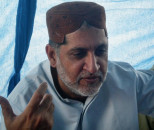A rendezvous with Riz
Star of The Reluctant Fundamentalist talks about his Pakistani heritage, meaningful cinema and Kate Hudson's hair.

A rendezvous with Riz
Sitting in a hotel lobby wearing a grey flat-cap, reading glasses, a Boxfresh tee-shirt and a black hoody, he could easily be one of the millions of hipsters exploring the city.
He’s not. In about a year’s time, he will be widely recognised as Changez, the fictional protagonist in Mohsin Hamid’s bestselling novel. Some, especially in the UK, will already remember him as Omar from the black comedy Four Lions, where he plays a wannabe British-Muslim terrorist who fails miserably at carrying out a militant mission. It is that film, and other smaller projects, that have won him the high-profile role which will bring Hamid’s novel to life.
Starring alongside Kate Hudson, Liev Schreiber, Kiefer Sutherland, Om Puri and Meesha Shafi, one would think, must have swollen his ego. It must have changed his outlook, it must have, at least, seen him adopt some ‘celebrity’ customs like bikram yoga, heavy partying or some celebratory designer shopping while he’s in the Big Apple.
“So far today, I’ve got up, I’ve watched Beverly Hills Cop 1 and 2 on TV, lounged around in bed and ate a lot of food,” he says, sniffling. “I’m a bit run down from filming, so I’ve taken some tablets, some vitamins and now I’m just in the lobby checking some emails and going on Skype. It’s the most chilled out, nothing day ever, which is great. It’s a massive luxury when you’re doing a shoot.”
Details of the film are sparse, such as exactly how the 30-year-old Changez’s monologue, read by hundreds of thousands worldwide (the book was a New York Times bestseller) will be turned into a movie. One thing is for sure though, Kate Hudson has dyed her hair brown to play Changez’s love interest and that is the entertainment angle most news outlets have taken to cover the film.
“I think that’s the nature of certain sections of the media,” says the actor, who turns 29 in December. “They will obsess about the minutiae of people’s personal lives, while others will talk about what they feel is more important. It’s up to us as the public where we go with our money.”
That’s the thing about Riz. You can try and talk about Kate Hudson’s hair colour, but you’ll probably end up talking about something far more philosophical.
“I was talking to someone who is developing a play with British troops who have come back from Iraq. He told me that a lot of the soldiers, they come back and they pick up these celebrity gossip magazines and they just kind of start crying because they can’t get their head around that what they’ve seen, what they’ve been through and what’s really going on and that this is what’s dominating people’s conversations and airtime.”
Riz graduated in Philosophy, Politics and Economics (PPE) from Oxford and studied drama following his degree. His first role, in 2006, was in The Road to Guantanamo, a docudrama directed by Palme d’Or nominee Michael Winterbottom. The opportunity to play Shafiq Rasul, a British Pakistani inmate, came while he was still at drama school.
“At that time, that was a dream role for me,” he says. “That was the kind of work I hoped to tackle as an actor. I felt very deeply and passionately about some of the injustices going on in the world at that time.”
As a British Pakistani, he had often worried whether he would be in demand as an actor.
“I thought: ‘Even if there are roles, are there roles that matter and might challenge people’s thinking? And are there roles that would have an impact and might engage what’s happened in the wider world?’ When that role came along, and I left drama school early for it, I guess that was the dream.”
It started a trend of playing characters that ‘matter’, as he put sit. Since then, he’s played a Muslim MI5 agent whose sister becomes a terrorist in London in Britz and a guilt-ridden drug dealer in Shifty. Next year, four of his films will be released: The Reluctant Fundamentalist, Trishna, a drama where he’s alongside Freida Pinto, Black Gold, a Hollywood style blockbuster about the discovery of oil in the Gulf, with Antonio Banderas, and Ill Manors, a movie directed by the British rapper Plan B.
Plan B, whose real name is Ben Drew, also happens to be a musician Riz convinced to headline a fundraising concert in London last year for Pakistan’s flood victims.That’s the other thing about him. Riz is a critically acclaimed rapper, when he’s not filming. He used his musical connections to host Party 4 Pakistan, where some 30 high-profile urban acts performed, voluntarily.
“The idea with that fundraiser was that with some of these things, you wait for something to happen and when it doesn’t, maybe it falls to us to do something and that’s what we did,” he says. “In no sense do I think of myself as a representative (of Pakistan) or a stamp bearer.”
That’s not to say, however, that he doesn’t share a close relationship with Pakistan. It’s a country he’s visited four times, on the first occasion as a baby to be circumcised, and shown off to his family in Karachi, though not necessarily in that order. “That’s actually my first memory. It’s slightly painful,” he jokes.
Then it was back to the motherland at the age of 15 to meet his cousins, three years later for a big wedding and in 2005 to film The Road to Guantanamo.
“I feel deeply connected to the culture,” he adds. “I speak Urdu at home, of course Pakistan is a deep part of who I am, even as it’s taken on a hybrid form being British.”
His maternal grandfather served at the Pakistani embassy in Calcutta, and his mother moved to Karachi aged seven. At the risk of sounding like Norman Tebbit, the British Conservative politician who famously coined the ‘cricket test’, an indicator of whether immigrants are loyal to Britain depending on which team they support, I ask Riz how he considers his nationality.
“I’m a British national, I also hold a Pakistani passport. In official terms I’ve got dual nationality,” he says, diplomatically.
And that’s the other thing about Riz. He’s completely inoffensive, yet charmingly charismatic.
It was his acting combined with impeccable research, masterful direction and a script bursting with humour which made Four Lions the most successful satirical film about terrorism to date.
Walking through London, Riz rarely manages to make it through a day without someone yelling the catchphrase ‘rubber-dinghy rapids bro’ at him. It’s one of many reasons to see the film. If you haven’t seen it and are in Pakistan, Riz quips, there are some pirate copies floating around apparently.
There’s also ‘Paki Rambo’, a phrase which has been turned into a rap by the Pakistani artist Adil Omar.
With jibes made throughout the film at converts to Islam and British Muslims who have become more religious since 9/11, you would have expected some criticism.
“I genuinely have not received one single bit of hate mail. Not a single one,” he says, almost in shock himself. “Not a single email, not a tweet message, Myspace, Facebook, nothing.”
Four Lions has become, Riz says excitedly, a cult classic.
“I feel privileged to be part of a film that’s enjoyable and bold and meaningful. I couldn’t even begin to tell you the scale of the response.”
With those words, he departs. It is a sentiment, I am certain, which will remain with him, even after experiencing the glitz and glamour of Hollywood.
Published in The Express Tribune, December Sunday Magazine, 18th, 2011.



















COMMENTS
Comments are moderated and generally will be posted if they are on-topic and not abusive.
For more information, please see our Comments FAQ